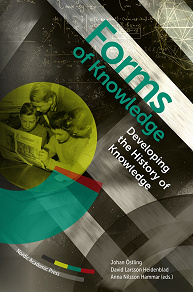
Förlag: Nordic Academic Press
Kategori:
Historia Engelskspråkiga
Tillgänglig sedan: mars 2020
Forms of Knowledge: Developing the History of Knowledge
Kunskapshistoria är ett dynamiskt forskningsfält som har framtiden för sig. Under de senaste åren har inriktningen etablerats som en ny och spännande historievetenskaplig inriktning både internationellt och i Sverige.
I boken Forms of Knowledge, sprungen ur den livaktiga kunskapshistoriska forskningsmiljön i Lund, samlas historiker med olika bakgrund och specialitet för att utforska kunskapshistoriens möjligheter. Några fokuserar på kunskapens plats i offentligheten eller samhället i stort, andra belyser kunskapens betydelse för den enskilda människan eller det lokala sammanhanget. Här finns också skribenter som koncentrerar sig på akademisk och systematiserad kunskap, andra på kunskapens existentiella eller vardagliga dimensioner.
Tillsammans sätter bokens bidrag ljuset på kunskapshistoriens mångfald och rikedom samtidigt som de bidrar till den teoretiska och metodiska utvecklingen av forskningsområdet.
–––
The history of knowledge is a dynamic field of research with bright prospects. In recent years it has been established as an exciting, forward-looking field internationally, with a strong presence in the Nordic countries.
Forms of Knowledge is the first publication by the Lund Centre for the History of Knowledge (LUCK). The volume brings together some twenty historians from different scholarly traditions to develop the history of knowledge. The knowledge under scrutiny here is the sort which people have regarded and valued as knowledge in various historical settings. The authors apply different perspectives to this knowledge, maintaining the historicity and situatedness of the production and circulation of knowledge.
The book presents the history of knowledge in all its rich diversity. The role of knowledge in public life is the focus of some chapters, while others concentrate on the importance of knowledge for individuals or local communities; some chart the realities of academic or systematic knowledge, others consider its existential or mundane dimensions. Taken together, they make a significant contribution to the theoretical, conceptual, and methodological advances in the field.
Information
Stöds av följande plattformar
PC/Mac
Surfplatta Läsplatta
Smartphone
